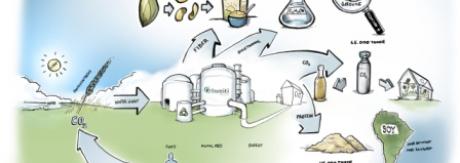
Danish bioethanol project threatened by political change of direction
The establishment of a biorefinery at the port of Grenaa is a 1.6 billion DKK project, and therefore it is a prerequisite that other Danish or foreign investors contribute with net capital and knowledge to the project.
But the reality is right now that potential investors are frightened off by very negative signals from the Danish government, writes Lars Attrup.
The government and several NGOs have decided that all biofuels produced from so-called food crops are bad.
The good is thrown away with the bad
Professor in biomass, Claus Felby, recognizes this picture and says to JP:
"Unfortunately all the nuances have been lost in the political process, and therefore they are in the process of throwing away the good with the bad."
He emphasizes that there is a problem with the sustainability of biodiesel, but that it is well-documented that bioethanol produced from e.g. corn or wheat has a good environmental profile, and establishes that the coming biorefinery in Grenaa is an example of an ethanol production that makes a positive contribution to the environment.
"The point is that the co-product from the production of bioethanol is a very large production of protein feed, which can replace some of all the soy protein that agriculture today imports from South America," says Clays Felby to JP.
Greenpeace states that to them, the ideal solution would be to look at all productions of biofuel and give them an individual environment assessment, which would secure that the non-sustainable productions would be squeezed out of the market.
“We still hope that the EU will introduce such a flexible, individual environment assessment, which reward the environmentally friendly technologies and squeeze out the polluting ones from the market. This is the ideal, but we acknowledge that the political realities right now point in another direction,” says Dan Belusa from Greenpeace to JP.
It looks like it could take a number of years before the real environmental value of the individual productions is incorporated into the member states’ climate accounts, and therefore Greenpeace feels obliged to support the Danish government’s wish to limit the use of all biofuels – good as well as bad.
Follow the developments within biorefining. hveiti regularly informs about our efforts to improve the environment.
Copyright © 2011 | Hveiti | Design Rabotnik




